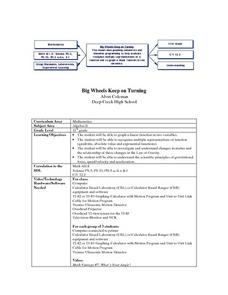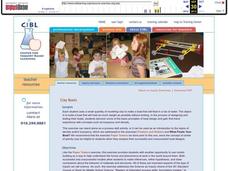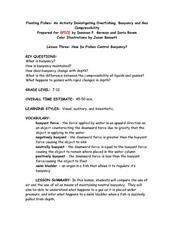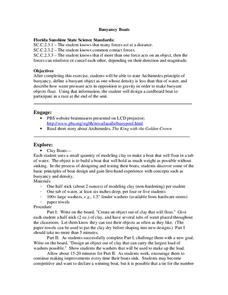Curated OER
Soaring With Air Power
Fourth graders view a Newton's Apple show that explores glider mechanics, explore the four forces, build and fly a glider to specific guidelines. They adjust the glider for greater accuracy and distance using four forces, and assess...
Curated OER
F = Ma, Inertia, And Action-reaction
Fourth graders investigate Newton's Second and Third Laws of Motion. They determine what makes objects harder or easier to push. While investigating they determine how applying force in order balance out gravity allows things to stay...
Curated OER
Bridges
Ninth graders use model-building to help comprehend the forces and phenomena at work in the world around them. They describe gravity as a universal force that pulls everything toward the center of the earth. Students distinguish between...
Curated OER
Newton's Laws of Motion
Young scholars perform three activities that each demonstrate one of Newton's Laws of Motion. They use a ramp and toy car to demonstrate inertia, calculate acceleration due to gravity, then use a medicine ball and rolling chair to...
Curated OER
Hurricanes
Students state and directly experience two laws of Physics (Law of Gravity, Law of Centrifugal Force) that affect weather. They explain the observations made when using the "hurricane machine" and relate them to other events and phenomenon.
Curated OER
Space Ship Pilot
Young scholars visualize the relation between acceleration and velocity in 2 dimensions. They are introduced to Newton's first law,and Newton's second law. Students work on an exploration activity where they condsider an example of a...
Curated OER
Erosion in Different Soils [Erosion Races]
Fourth graders review how erosion can happen by wind, water, and gravity which they studied in previous lesson. They attempt to discover if all soils erode at the same rate. In small groups, 4th graders experiment with three different...
Curated OER
Big Wheels Keep on Turning
Eleventh graders work in groups and investigate how force determines the speed and distance then they view the video, "Math Vantage #7: What's Your Angle?." They are given a real life problem to solve using speed, ramps, angle, incline...
Curated OER
Simple Machines
Students demonstrate an understanding of how simple machines work. They show how various forces affect movement and advantages of them. They also design a compund machine. Students decide which level of questions they want to do and...
Curated OER
Clay Boats
Seventh graders are given the opportunity to use model-building as a way to help comprehend the forces and phenomena at work in the world around them. They use both successful and unsuccessful models to make inferences, refine...
Curated OER
Observing Motion
First graders explore movement and motion. In this motion lesson, 1st graders how objects can move as well as how the Earth is in constant motion and the force of gravity. Students complete a coloring sheet.
Curated OER
Simple Machines I - Inclined Planes, Wedges, and Screws
The principles and uses of inclined planes, screws, and wedges are the focus of a science lesson. In it, youngsters come up with every day examples of simple machines, and build an example of one in class. That project is then used to...
Curated OER
The Elastic Racquet
High schoolers use this introductory lab using a tennis racquet, however it is very difficult to study because of the strings and the racquet stretch so little and so quickly during a match that students were unable to make simple...
Curated OER
Simple Machines IV - Wheels and Axles
Youngsters are introduced to the basic principles and uses of the wheel and the axle. They come up with every day examples of simple machines and look into why the wheel and the axle are best-used as a paired machine instead of used...
DiscoverE
Build a Straw Bridge
Build teamwork skills while building a bridge. Scholars work together in groups to create a bridge out of 20 straws and tape. There is a minimum span length of 25 centimeters, but otherwise, let creativity run wild.
Curated OER
Going the Distance
Students experiment in small groups to answer the question, "Is there a relationship between ramps and speed?" They apply a formula to calculate the speed of the cars used in the experiment, complete the associate lab report, and...
Curated OER
Simple Machines Worksheet
In this simple machines worksheet, students complete a chart. They look at a picture of a simple machine, draw/paste an example of each one for homework. They use a web quest to find 2 more facts about each one and write it in the chart....
Curated OER
Floating Fishes: How do Fishes Control Buoyancy?
Playing with balloons, water, oil, and bottles help put this lesson over the top! Participants use air-filled balloons in water tanks to experience gas compression. They also use oil-filled bottles to experiment with buoyancy. Included...
Curated OER
Integrating Science and Literature
Maximize time and engage learners by using children's literature in your science lessons.
Curated OER
Circle of Pong
Learners, in groups, use given materials to devise a way to deposit a ping-pong ball into a paper cup that is located in the middle of a 6-foot diameter circle, while standing outside the circle.
Center for Precollegiate Education and Training
Buoyancy Boats
What did the sea say to the boat? Nothing, it just waved. An inquiry-based lesson starts with a simple concept on the Archimedes Principle and challenges pupils to make something out of clay that floats. Then, they design...
Curated OER
Suited for Space
A fantastic lesson on survival in outer space should excite your learners! Pupils explore the challenges that living, working, and surviving in space elicit. They focus on the spacesuit itself; how it protects astronauts, and enables...
Curated OER
Apollo Moon Landing
Students explore paper rockets, learn about the Apollo Program and Apollo spin-offs, and use simple office supplies to design and create a new useful product. This amazing plan is incredibly well written and leads students through a...
Curated OER
Fish and Clips
Youngsters test magnetic strength by measuring the mass of paper clips that they "hook" with a magnet. Your first and second graders should love the hands-on activities associated with this plan. The reproducible materials are quite good...



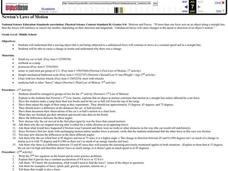

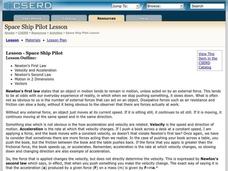
![Erosion in Different Soils [Erosion Races] Lesson Plan Erosion in Different Soils [Erosion Races] Lesson Plan](http://content.lessonplanet.com/resources/thumbnails/140405/large/cgrmlwnvbnzlcnqymdezmdmyos01nde3lxfmmzy0dc5qcgc.jpg?1414240121)
